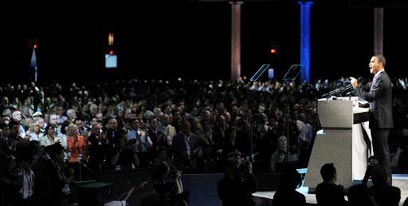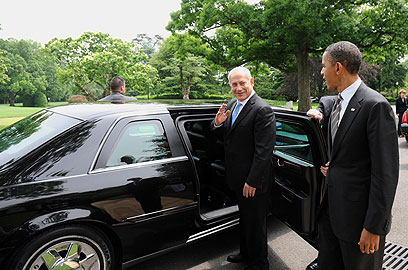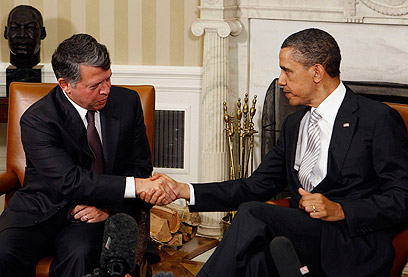
Netanyahu denies crisis with US
Prime minister's team in Washington hopes to change President Barack Obama's tone ahead of his AIPAC speech. Netanyahu demands that he address right of return, settlement blocks. Reports of disagreement were 'blown out of proportion,' Netanyahu says
WASHINGTON - Prime Minister Benjamin Netanyahu on Saturday said that media accounts of the disagreement between himself and US President Barack Obama have been "blown way out of proportion."
"It's true we have some differences of opinion, but these are among friends," Netanyahu told the Associated Press.
Meanwhile, the prime minister's entourage and US officials continued working on amending Obama's speech before AIPAC on Sunday. Israel hopes the president will change his tone after declaring on Thursday that peace negotiations must be based on 1967 borders.
But White House officials told ABC that the president is not expected to change his position regarding principles for negotiations ahead of his AIPAC speech.
The Israeli team in Washington is demanding that Obama bolster Israel in his speech by stressing that there will be no right of return and pledging on security arrangements as well as on settlement blocks.

'Disagreements blown out of proportion.' Netanyahu and Obama (Photo: Moshe Milner, GPO)
While Netanyahu was pleased with Obama's comments on Hamas, he hopes the president will say that the group must recognize Israel before peace talks resume, as he did in the past.
It is estimated that Netanyahu will be willing to negotiate on settlements outside the blocks and make do with Israeli control over the large settlement blocks.
The British Telegraph reported that AIPAC chief Lee Rosenberg urged his fellow lobby members not to boo Obama during his speech. According to the report, the US president plans to ask for public endorsement for his concept of a Palestinian state based on 1967 borders during his impending visit in London. In this, he aims to persuade the Palestinians not to seek UN recognition of a state.
Netanyahu, on his part, has asked Obama to form a group of influential European states to reject the Palestinian UN bid.

Obama addresses AIPAC in 2008 (Photo: AFP)
Meanwhile, the Israeli delegation in Washington spent the weekend trying to deny a crisis with the US despite the tensions caused by Obama's Mideast speech and Netanyahu's response. "There is no crisis with the Americans. We continue to talk and there are attempts to calm the atmosphere," one official said.
The Americans are also trying to calm spirits, ahead of Netanyahu's speeches in Congress and before the AIPAC conference.
US elements estimated that Obama does not want to alienate Jewish donors before the next elections and therefore may alter his speech for AIPAC.
White House reporters are already speculating about a possible Obama visit in Israel. Several hours after his AIPAC address, the president is scheduled to depart for a six-day visit in Europe to include Ireland, Britain, France and Poland.

Obama to visit Israel? (Photo: Avi Ohayon, GPO)
Britain harshly criticized the approval of 1,500 housing units in Har Homa and Pisgat Ze'ev and has called Israel to avoid unconstructive activity which undermines stability.
Despite tensions with the US, Netanyahu feels that politically he has the Israeli public's support on the sensitive issues he has presented to Obama.
The New York Times reported of power struggles between senior Obama advisors over the past few months. They argued over the extent to which the president should outline the US position on solving the Israeli-Palestinian crisis.
Special Mideast envoy George Mitchell, who recently resigned his post, and Secretary of State Hillary Clinton wanted Obama to present a comprehensive US peace plan including US policy on such core issues as Jerusalem and the right of return.
Senior Advisor Dennis Ross, however thought it would be unwise for the US to be seen as publically breaking from Israel. Ross subscribes to the opinion that that peace negotiations will succeed only if the US closely coordinates its efforts with the Israelis.
It remains unclear whether Obama's efforts to prevent a UN vote on a Palestinian state will prove fruitful.
The Palestinian Authority has already announced it will not back out on its plan. Fatah Central Committee Member Nabil Shaath said that Netanyahu's statements prove he's not a partner for peace.
Meanwhile, President Mahmoud Abbas has asked the Arab League to convene and discuss the US vision for a solution to the Israeli-Palestinian conflict. An official source in Ramallah said such a meeting will be held later this month.
King Abdullah pessimistic
Jordan's King Abdullah said he does not have high hopes for progress in the peace process and estimated negotiations between Israel and Palestinians will not be renewed until the end of 2011.
"My instincts tell me not to expect much over the next couple of months, unfortunately," King Abdullah said in an interview to ABC network. “I just have a feeling that we're going to be living with the status quo for 2011.”

King Abdullah with Barack Obama (Photo: Reuters)
Abdullah discussed his meetings with PM Netanyahu, saying, "When he speaks to me, I see his vision of peace with the Palestinians, peace with the Arabs and I've always left those meetings feeling very optimistic.”
George Mitchell was also interviewed for the ABC television show.
"The president didn't say that Israel has to go back to the 1967 lines. He said with agreed swaps,” explained Mitchell. “Swaps means an exchange of land intended to accommodate major Israeli population centers to be incorporated into Israel and Israel's security needs. Agreed means through negotiations. Both parties must agree.”
Mitchell emphasized that Obama’s statement on borders was identical to the proposal presented by former Israeli Prime Minister Ehud Olmert.
“In a later interview, let me read to you what he said: ‘I presented Abbas with a comprehensive plan. It was based on the following principles. One, there would be a territorial solution to the conflict on the basis of the 1967 borders, with minor modifications on both sides,’” Mitchell said of Olmert’s previous comments.
Attila Somfalvi and AP contributed to this report
- Follow Ynetnews on Facebook










